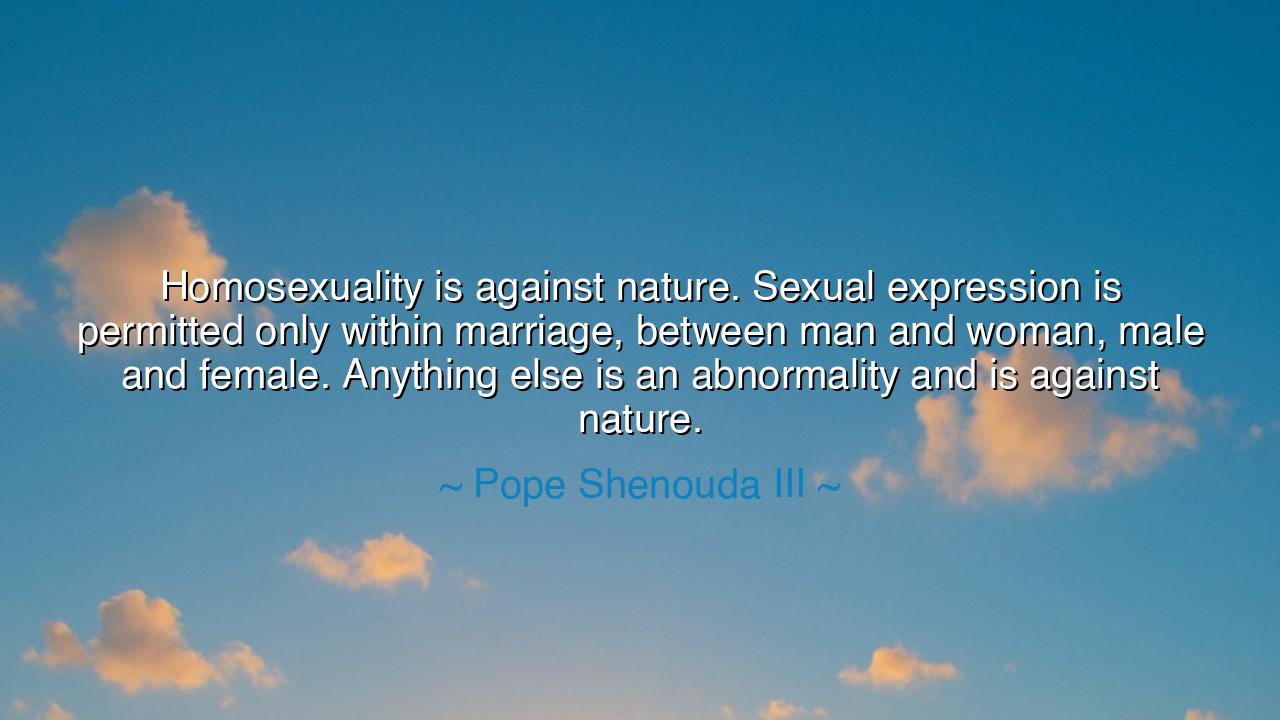
Homosexuality is against nature. Sexual expression is permitted
Homosexuality is against nature. Sexual expression is permitted only within marriage, between man and woman, male and female. Anything else is an abnormality and is against nature.






“Homosexuality is against nature. Sexual expression is permitted only within marriage, between man and woman, male and female. Anything else is an abnormality and is against nature.” — Pope Shenouda III
In this stern and absolute declaration, Pope Shenouda III, the late patriarch of the Coptic Orthodox Church, speaks from the ancient framework of religious law and tradition — a worldview in which marriage and sexuality are seen not as human inventions but as divine institutions. His words reflect a theology rooted in the creation story itself: that man and woman, by their design, are two halves of one sacred whole, joined not merely by desire but by purpose. In this view, sexual expression is not a private indulgence but a holy act bound by covenant — a reflection of divine order in the natural world.
To understand his teaching, one must return to the origins of this belief, deep within the Scriptures and traditions of early Christendom. In the book of Genesis, the Creator forms Adam and Eve, commanding them to “be fruitful and multiply.” From this moment, the union of male and female becomes the archetype of human love and life, sanctified by marriage and governed by the laws of fidelity and procreation. The Church Fathers, reading these sacred texts, taught that sexuality is not evil, but sacred — when disciplined by love and law. To act against this order, in their eyes, is to rebel not only against God but against the harmony of creation itself.
Pope Shenouda III, as the spiritual shepherd of millions, inherited this ancient understanding. Living through a century of social transformation, he saw the moral fabric of the world shifting beneath the weight of modernity. His statement, therefore, was not born of personal disdain, but of defense — a defense of what he perceived to be divine order against the growing acceptance of homosexuality as natural and good. To him, the “against nature” phrasing did not mean hatred of individuals, but a warning against what he viewed as a distortion of the sacred balance set forth at creation.
Throughout history, similar voices have risen whenever the world’s understanding of love and morality has changed. In the early Roman Empire, when Christian ethics first spread, the idea that sexual expression should be confined to marriage was itself revolutionary. Pagan Rome celebrated indulgence, yet the early Christians preached restraint and purity — not as repression, but as liberation from chaos. In much the same way, Pope Shenouda saw himself as a guardian of spiritual boundaries, preserving what he believed to be the Creator’s design amid a world that blurred the lines of nature.
Yet, even as his words echo the authority of ancient doctrine, they also stir the modern conscience. For in every age, mankind wrestles with the definition of nature itself. What one era calls divine order, another calls evolving truth. And though the Pope spoke from conviction, his statement reminds us of a broader human pattern — that societies, religions, and individuals alike must grapple with the tension between tradition and transformation. Whether one agrees or disagrees with his stance, the quote stands as a reflection of how faith seeks to preserve meaning in an ever-changing moral landscape.
Consider the story of the Council of Nicaea in the fourth century, when the early Church faced deep division over the nature of Christ. It was not hatred that drove the debates, but fear — fear that truth might be lost amid competing voices. Similarly, when Pope Shenouda spoke of sexuality, he was speaking from that same fear — that moral relativism would unravel what generations had built. His words, though severe, arise from a desire for order, purity, and spiritual stability in a world he believed was losing its way.
The lesson, then, is not to accept or reject his statement blindly, but to understand its roots — to see it as part of humanity’s long struggle to reconcile divine command with human freedom. Even when one disagrees, there is wisdom in examining why faith speaks as it does. For if the ancients sought truth through order, the modern world seeks it through compassion; and both are incomplete without the other.
Let this teaching, therefore, awaken reflection rather than wrath. Faith and conscience must walk together, each humbling the other. From Pope Shenouda’s stern defense of tradition, we learn the importance of conviction; from modern voices of inclusion, we learn the power of mercy. And perhaps, in the balance between these two, humanity will continue its eternal journey — not to escape nature, but to understand it more fully, as both a gift of creation and a mystery of the divine.






AAdministratorAdministrator
Welcome, honored guests. Please leave a comment, we will respond soon